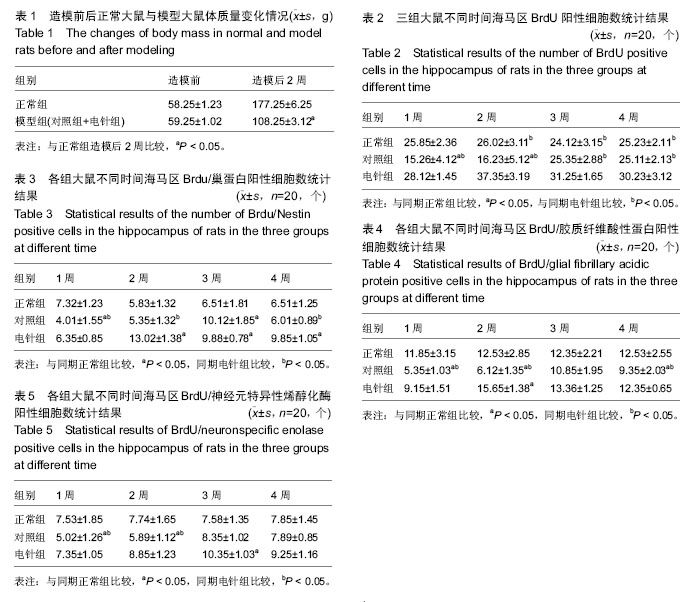| [1] 李晓滨,曾园山,陈玉玲,等.督脉电针与神经干细胞移植对脊髓全横断大鼠后肢功能恢复的影响[J].解剖学报,2004, 35(6):582-588.
[2] 崔晓军,李伊为,陈东风,等.督脉电针对脊髓损伤大鼠神经干细胞的作用[J].解剖学研究,2002,24(3):180-183.
[3] 刘喆,赖新生.电针对局灶性脑缺血大鼠神经干细胞巢蛋白表达的影响[J].中华物理医学与康复杂志,2005,27(10): 591-594.
[4] Wang X,Liang XB,Li F et al.Therapeutic strategies for Parkinson's disease: the ancient meets the future-- traditional Chinese herbal medicine, electroacupuncture, gene therapy and stem cells. Neurochem Res. 2008; 33(10):1956-1963.
[5] 叶飞,余晶晶,邓晓玲,等.电针刺激对脑梗死大鼠内源性神经干细胞及神经功能恢复的影响[J].中华物理医学与康复杂志,2012,34(11):801-805.
[6] 于东强,裴海涛,张佩海,等.电针对大鼠局灶性脑缺血再灌注海马区内源性神经干细胞巢蛋白的影响[J].中国针灸,2010,30(11):929-932.
[7] 彭力,黄晓琳,韩肖华,等.电针结合经颅磁刺激对脑缺血大鼠神经干细胞增殖和电跳台的影响[J].中国中医急症, 2008,17(2):206-208.
[8] 刘喆,赖新生.电针对局灶性脑缺血成年大鼠内源性神经干细胞增殖的影响[J].中国康复医学杂志,2007,22(3): 218-221,224.
[9] 倪进忠,丁艳霞,熊克仁,等.电针对帕金森病模型大鼠黑质神经干细胞巢蛋白、PCNA和β-微管蛋白表达的作用[J].解剖学杂志,2012,35(2):181-185.
[10] 陈斌,陶静,黄佳,等.从Notch通路探讨电针促进局灶性脑缺血再灌注大鼠海马神经干细胞增殖的作用机制[J].中国康复医学杂志,2014,29(5):399-404.
[11] 刁利红,于海波,皮敏,等.电针任脉和肌肉注射碱性成纤维细胞生长因子对脑缺血模型大鼠侧脑室下区原位神经干细胞增殖的影响[J].中国组织工程研究与临床康复,2008, 12(8):1435-1439.
[12] Lu T,Luo Y,Sun H,et al.Electroacupuncture improves behavioral recovery and increases SCF/c-kit expression in a rat model of focal cerebral ischemia/ reperfusion. Neurol Sci.2013;34(4):487-495.
[13] 张运康,陶连方.电针对脑缺血再灌注大鼠学习记忆能力及血管内皮生长因子表达的影响[J].华中科技大学学报:医学版,2013,42(1):70-73.
[14] 王彦春,马骏,王华,等."双固一通"法对帕金森病模型大鼠神经干细胞增殖及分化的影响[J].中国针灸,2006,26(4): 277-282.
[15] Wan, J.-F.,Zhang, S.-J.,Wang, L. et al.Implications for preserving neural stem cells in whole brain radiotherapy and prophylactic cranial irradiation: A review of 2270 metastases in 488 patients. J Radiat Res. 2013 Mar 1;54(2):285-291.
[16] Yang T, Liu LY, Ma YY, et al.Notch signaling-mediated neural lineage selection facilitates intrastriatal transplantation therapy for ischemic stroke by promoting endogenous regeneration in the hippocampus. Cell Transplant. 2014 ;23(2):221-238.
[17] 陶静,陈立典,薛偕华,等.电针对局灶性脑缺血成年大鼠神经干细胞增殖、分化的影响[J].中国康复医学杂志,2008, 23(12):1061-1063,1073,后插3.
[18] Nochi R, Kaneko J, Okada N, et al.Diazepam treatment blocks the elevation of hippocampal activity and the accelerated proliferation of hippocampal neural stem cells after focal cerebral ischemia in mice. J Neurosci Res. 2013 ;91(11):1429-1439.
[19] 唐强,徐志华,白晶,等.电针对大鼠脑梗死后内源性神经干细胞增殖迁移的影响[J].针灸临床杂志,2008,24(8): 49-51.
[20] Xu J,Chen Y,Liu S, et al.Electroacupuncture at Zusanli (ST-36) Restores Impaired Interstitial Cells of Cajal and Regulates Stem Cell Factor Pathway in the Colon of Diabetic Rats.Journal of evidence based complementary & alternative medicine.2012; 17(2):117-125.
[21] Ding Y, Yan Q, Ruan JW, et al.Bone Marrow Mesenchymal Stem Cells and Electroacupuncture Downregulate the Inhibitor Molecules and Promote the Axonal Regeneration in the Transected Spinal Cord of Rats.Cell transplantat.2011;20(4):475-491.
[22] Chen Y,Xu J,Liu S,et al.Electroacupuncture at ST36 increases contraction of the gastric antrum and improves the SCF/c-kit pathway in diabetic rats.Am J Chin Med. 2013;41(6):1233-1249.
[23] 芮君,裴海涛.电针刺激对脑缺血大鼠神经干细胞分化的影响[J].青岛大学医学院学报,2011,47(4):327-328.
[24] Nam SM, Kim JW, Yoo DY, et al.Additive or synergistic effects of aluminum on the reduction of neural stem cells, cell proliferation, and neuroblast differentiation in the dentate gyrus of high-fat diet-fed mice. Biol Trace Elem Res. 2014;157(1):51-59.
[25] Nam SM, Kim JW, Yoo DY,et al.Effects of treadmill exercise on neural stem cells, cell proliferation, and neuroblast differentiation in the subgranular zone of the dentate gyrus in cyclooxygenase-2 knockout mice.Neurochem Res.2013,38(12):2559-2569.
[26] 陈雅云,曾园山,张伟,等.督脉电针对移植在大鼠脊髓全横断损伤处的神经干细胞存活分化和迁移的影响[J].解剖学报,2006,37(4):381-386.
[27] Yang EJ,Jiang JH,Lee SM, et al.Electroacupuncture reduces neuroinflammatory responses in symptomatic amyotrophic lateral sclerosis model. J Neuroimmunol. 2010;223(1-2):84-91.
[28] Ho TJ, Chan TM, Ho LI,et al.The possible role of stem cells in acupuncture treatment for neurodegenerative diseases: a literature review of basic studies.Cell Transplant. 2014;23(4-5):559-566.
[29] 薛玉仙,高剑峰,刘轲,等.电针干预对老龄大鼠脑缺血再灌注海马齿状回内源性神经干细胞增殖分化的影响[J].北京中医药大学学报:中医临床版,2009,16(5):1-5.
[30] 安国防,徐剑文.电针刺激促进神经干细胞的增殖和分化[J].中国医药指南,2012,10(19):299-300.
[31] 杨春壮,冯克俭,刘星,等.电针对神经干细胞海马内移植老年性痴呆大鼠行为学及海马超微结构的影响[J].中医药学报,2012,40(4):87-89.
[32] Segi-Nishida E, Warner-Schmidt JL, Duman RS,et al.Electroconvulsive seizure and VEGF increase the proliferation of neural stem-like cells in rat hippocampus. Proc Natl Acad Sci U S A. 2008;105(32): 11352-11357.
[33] Seki T, Sato T, Toda K, et al.Distinctive population of Gfap-expressing neural progenitors arising around the dentate notch migrate and form the granule cell layer in the developing hippocampus. J Comp Neurol. 2014; 522(2):261-283.
[34] Yoneyama M,Kawada K,Shiba T,et al.Endogenous nitric oxide generation linked to ryanodine receptors activates cyclic GMP / protein kinase G pathway for cell proliferation of neural stem/progenitor cells derived from embryonic hippocampus. J Pharmacol Sci. 2011; 115(2):182-195. |
.jpg)

.jpg)
.jpg)